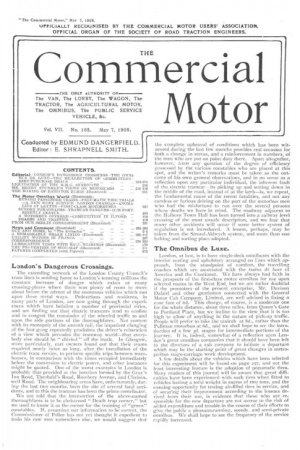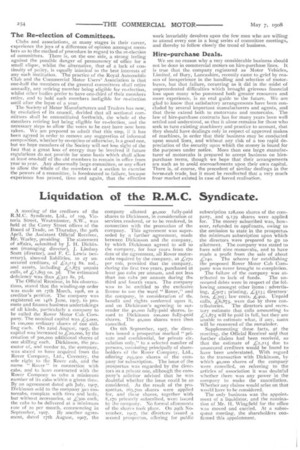London's Dangerous Crossings.
Page 1

Page 2

If you've noticed an error in this article please click here to report it so we can fix it.
The extending network of the London County Council's tram lines is sending home to London's teeming millions the constant increase of danger which exists at many crossing-places where there was plenty of room to move about before the advent of the enormous vehicles which run upon these metal ways. Pedestrians and residents, in many parts of London, are now going through the experiences which have befallen a number of provincial cities, and are finding out that electric tramcars tend to confine and to congest the remainder of the wheeled traffic to and upon the side portions of the thoroughfares. Not content with its monopoly of the smooth rail, the impatient clanging of the foot gong repeatedly proclaims the driver's reiteration of a view which pervades the tramway world—that everybody else should be " chivied " off the track. In Glasgow, more particularly, cart owners found out that their teams required nearly twice as long, after the installation of the electric tram service, to perform specific trips between warehouses, in comparison with the times occupied immediately before the conversion to electric power, and other instances might be quoted. One of the worst examples in London is probably that provided at the junction formed by the Gray's Inn Road, Theobald's Road, Rosebery Avenue, and Clerken_ well Road. The neighbouring areas have, unfortunately, during the last two months, been the site of several fatal accidents, and to this the tramcar has been the prime contributor.
We are told that the intersection of the above-named thoroughfares is to be christened " Death trap corner," but we used to know it as the corner for the training of "green" constables. If, assumin<.-tour information to be correct, the Commissioner of Police has not yet thought it expedient to train his raw men somewhere else, we would suggest that
the complete upheaval of conditions which has been witnessed during the last few months provides real occasion for both a change in status, and a reinforcement in numbers, of the men who are put on point fluty there. Apart altogether, however, from any question of the degree of efficiency possessed by the various constables who are placed at this spot, and the writer's remarks must be taken as the outcome of his own general Observations, and in no sense as a reflection upon any particular individual, the inherent fault of the electric tramcar—its picking up and setting down in the middle of the road, instead of at the kerb—is, we repeat, the fundamental cause of the recent fatalities, and not any careless or furious driving on the part of the motorbus men who had the misfortune to run over the several persons whose deaths we have in mind. The roadway adjacent to the Holborn Town Hall has been turned into a railway level crossing of the most unsafe description, and we fear that many Other accidents will occur if some better system of regulation is not introduced. A lesson, perhaps, may be taken from the Strand-Aldwych system, and more than one halting and sorting place adopted.
The Omnibus de Luxe.
London, at last, is to have single-deck omnibuses with the interior seating and upholstery arranged on lines which approach, from the standpoint of comfort, the travelling coaches which are associated with the trains de luxe cif America and the Continent. We have always had faith in the prospects of the first-class motor omnibus for use upon selected routes in the West End, but we are rather doubtful if the promoters of the present enterprise, Mr. Davison Dalziel and other gentlemen connected with the General Motor Cab Company, Limited, are well advised in fixing a zone fare of 6d. This charge, of course, is a moderate one for the whole distance, about three miles, from Queen's Gate to Portland Place, but,we incline to the view that it is too high to allow of anything in -the nature of pick-up. traffic. People will prefer to Enke thetaxicab at 8d., rather than the Pullman motorbus at 6d., and we shall hope to see the introduction of a few 3d. stages for intermediate portions of the journey. It is, indeed, somewhat of a reflection upon London's great omnibus companies that it should have been left to the directors of a cab company to initiate a departure which may be the starting point of great changes in metropolitan stage-carriage work development.
A few details about the vehicles which have been selected for this experiment will be found on page 2g7, and not the least interesting feature is the adoption of pneumatic tires. Many readers of this journal will be aware that great difficulties have been experienced with such tires when fitted to vehicles having a total weight in excess of two tons, and the ensuing opportunity for testing air-filled tires in service, and of securing their improvement according to the lessons derived from their use, is evidence that those who are responsible for the new departure are not averse to the risk of added expenditure and trouble in the course of their efforts to give the public a pleasant-running, speedy, and semi-private omnibus. We shall hope to see the frequency of the service rapidly increased.
The Re-election of Committees.
Clubs and associations, at many stages in their career, experience the joys of a difference of opinion amongst members as to the method of procedure in regard to the re-election of committees. There is, oft the one side, a strong feeling against the possible danger of permanency of office for a small clique, whilst the alternative, that of a lack of continuity of policy, is equally inimical to the best interests of any such institution. The practice of the Royal Automobile Club and the Commercial Motor Users' Association is that one-half the members of the general committees shall retire annually, any retiring member being eligible for re-election, whilst other bodies prefer to have one-third of their members retire, and to hold such members ineligible for re-election until after the lapse of a year. The Society of Motor Manufacturers and Traders has now, by resolution of its council, decided that all sectional committees shall be reconstituted forthwith, the whole of the members retiring but being eligible for re-election, and the necessary steps to allow the votes to be cast have now been taken. We are prepared to admit that this step, if it has been agreed in order to remove any suggestion of informal composition, whether by co-option or otherwise, is a good one, but we hope members of the Society will not lose sight of the fact that a great loss of energy may be involved if future regulations do not provide for some basis which shall allow at least one-half of the old members to remain in office from year to year. Any abnormally large committee, or any effort to allow the whole of the members of a section to exercise the powers of a committee, is foredoomed to failure, because experience has proved, time and again, that the effective work invariably devolves upon the few men who are willing to attend every one in a long series of committee meetings, and thereby to follow closely the trend of business.
Hire-purchase Deals.
We see no reason why a very considerable business should not be done in commercial motors on hire-purchase lines. It is true that the company registered as Motor Vehicles, Limited, of Bury, Lancashire, recently came to grief by reason of inexperience in the handling and selection of motorbuses, but that failure, occurring as it did in the midst of unprecedented difficulties which brought grievous financial loss upon many who possessed both greater resources and more experience, is no real guide to the future. We are glad to know that satisfactory arrangements have been concluded by several important manufacturers and agents, and that these extend both to motorvans and motorcabs. The law of hire-purchase contracts has for many years been well settled and understood, so that it alone remains for those who seek to turn existing machinery and practice to account, that they should have dealings only in respect of approved makes of machines, in order that their business may be conducted upon sound lines, and without any risk of a too rapid depreciation of the security upon which the money is found for the purposes under notice. More than one large manufacturer of motorcabs is prepared to accept business on hirepurchase terms, though we hope that their arrangements are such as to avoid encroachments upon their own capital. There is, of course, the precedent of similar dealings in the horse-cab trade, but it must be recollected that a very much freer market existed in case of forced realisation.




















